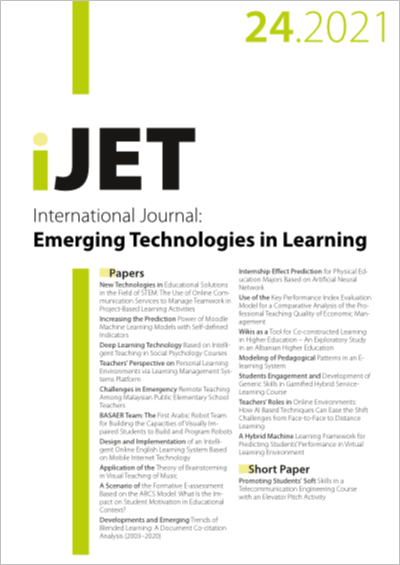Challenges in Emergency Remote Teaching Among Malaysian Public Elementary School Teachers
DOI:
https://doi.org/10.3991/ijet.v16i24.27453Keywords:
Emergency remote teaching, challenges, education, Covid-19, elementary school teacherAbstract
The purpose of this study was to explore challenges public elementary school teachers faced when conducting emergency remote teaching during the pandemic in Malaysia. The scope of the study was limited to remote teaching which was conducted between Mar 2020 and December 2020, when Malay-sia government urged an emergency national lockdown to stop the spread of coronavirus in the country. This study adopted qualitative, case study re-search design. 10 public elementary school teachers were sampled using a purposive sampling method. Semi-structured interviews were employed to gain the insights of teachers’ challenges in implementation of emergency re-mote teaching. The data were analysed using thematic analysis and a facilitation of Nvivo 12 programme. There were six main themes emerged on teachers’ challenges, which were (1) Directing gateway; (2) Lack of skill and knowledge; (3) Unable to meet all needs; (4) Unable to engage students; (5) Lack of support from parents; and (6) Had no proper guideline. As teachers were the key persons in determining the functionality, effectiveness and de-velopment of future remote teaching, hence it was extremely crucial to listen to teachers’ voices and figure out how these educators could be supported in the future to benefit the learners and communities.
Downloads
Published
2021-12-21
How to Cite
Yong, K. L., Mohd Zaid, N., Abd. Wahid, N. H., Mohamad Ashari, Z., Suhairom, N., & Mohamad Said, M. N. H. (2021). Challenges in Emergency Remote Teaching Among Malaysian Public Elementary School Teachers. International Journal of Emerging Technologies in Learning (iJET), 16(24), pp. 74–90. https://doi.org/10.3991/ijet.v16i24.27453
Issue
Section
Papers
License
Copyright (c) 2021 Keow Lee Yong, Norasykin Mohd Zaid, Nur Husna Abd. Wahid, Zakiah Mohamad Ashari, Nornazira Suhairom, Mohd Nihra Haruzuan Mohamad Said

This work is licensed under a Creative Commons Attribution 4.0 International License.



